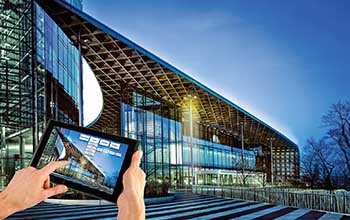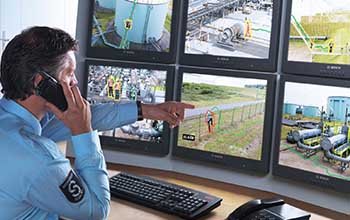IPCS came in to being as a result of the desire of a large number of well-wishers demanding a global automation training provider to impart modern technical training of high standards. The expert team had developed and implemented training program ensuring that trainees can maximize the time available to them as well as optimize the training process through the use of training aids and performance reviews and evaluations. Our trainees are inspired to involve in research, excel and innovate, so that they can be a good competitor in prominent industries.
Building Management System (BMS) enables the monitoring of various sensors of the buildings to make it safe and secure by providing both control and monitoring of the electrical and mechanical equipment of the building to improve the building operations to transform it into Smart Building. The world-class BMS training is implemented through the optimal mixture of theory and practical sessions that may includes projects. In this modern era of smart automation systems, Building Management Systems plays a vital role in automation industry. All the prominent industries are looking for skilled technicians who can meet all the requirements in BMS sector. Our BMS training program is a golden opportunity to enhance your employ-ability in BMS sector and home automation. BMS training program is handled by project experts in equipment manufactured by eSSL, W Box, Honeywell, Hikvision, Texecom, etc.
BUILDING MANAGEMENT SYSTEM (BMS) TRAINING SPECIFICATIONS :
Certified BMS Engineer (CBE) Duration – 3 Months (240 hrs)
BMS Controllers CCTV, Fire Alarms, Security Systems, Access Controls, PLC, SCADA, HVAC, Lighting Controls Training
 The tremendous growth in construction industry lead to more optimized controls and energy saving practices. The world is becoming smarter and greener by the implementation of high end automation systems. The industry is looking for skilled engineers who can meet all the requirements in BMS sector. IPCS CERTIFIED BMS ENGINEER training program is a golden opportunity to enhance your employ ability in home automation and BMS sector.
The tremendous growth in construction industry lead to more optimized controls and energy saving practices. The world is becoming smarter and greener by the implementation of high end automation systems. The industry is looking for skilled engineers who can meet all the requirements in BMS sector. IPCS CERTIFIED BMS ENGINEER training program is a golden opportunity to enhance your employ ability in home automation and BMS sector.
CCTV & Security Systems Duration – 90 Hours
CCTV, Security Systems, Access Controls Training
 Building Management Systems leads to more optimized control of resources, high end security and ease of access from anywhere. The internet of things initiated by big technology ventures will create a smart world which can be controlled by just a click. The industry is looking for skilled CCTV technicians. IPCS CERTIFIED CCTV & Security System training program is a golden opportunity to enhance your employ ability in home, Office & Building Automation.
Building Management Systems leads to more optimized control of resources, high end security and ease of access from anywhere. The internet of things initiated by big technology ventures will create a smart world which can be controlled by just a click. The industry is looking for skilled CCTV technicians. IPCS CERTIFIED CCTV & Security System training program is a golden opportunity to enhance your employ ability in home, Office & Building Automation.
Diploma in Building Management Systems Duration – 6 Months (360 hrs)
Fundamentals of Building Management System
- Basic Design Criteria
- Components Used in BMS
- Concept of Green & Smart Design
- Energy Management Systems
- MEP Design Fundamentals
Basic Electronics
- Basic Rules – OHMS Law, Faradays Law, KCL, KVL
- Passive Components
- Active Components
- Power Electronics Components
- Familiarization of Tools – Multimeter, Soldering, Desoldering
- Selection of Components and Color Codes
Digital Circuits
- Number Systems & Conversion
- Binary Operations
- Logic Gates
- Universal Gates
- 555 Timer
Micro controllers
- Microprocessors & Micro Controllers
- Architecture
- Programming Practice
- IC Burning
- Interfacing Keyboard, LCD, Stepper Motor, LED Displays
Basic Electrical Engineering
- Single Phase and Three Phase Systems
- Different Types Loads – Load Calculation
- Measurement of Current, Voltage, Power
- Different Types of Motors
- Different Types of Earthing
Relay Logic Systems
- Basic of Relays, Contractors, Timers, OLR, MCCBB, ACB
- Digital Timers, Counters
- Motor Control Circuits – D.O.L, Star, Delta
- Implementation of Fire Alarm Logic
Control Panels
- Different Types of Panels
- Panel Components
- Wiring and Trouble Shooting
- AMF Panels
- APFC Panels
- Power Management Systems
Servo Drives
- Basics of Motor – DC Motor, Stepper, Servo
- Feedback System
- Speed Control
- Torque Control
- Selection of Servo Motor and Drives
- Programming of Motor Drives
- Interfacing with PLC, HMI
VFD’s
- Selection of VFD’s
- Programming of VFD
- Fault Correction
- Interfacing with HMI, PLC
CAD Drawing
- Single Line Diagram
- Standard Symbols
- MEP Design Concepts
- Plotting
- Interfacing with HMI, PLC
Networking
- Concept of LAN, VAN
- Implementing of Networks
- Sharing of Files, Printers, Scanners Etc.
- Network Protocols – TCP/IP, Ethernet, Modbus, Canbus, Profibus
CCTV – Honeywell & Hikvision
- Selection of Camera
- Cabling and Termination
- Different Types of Cameras
- Night Vision Systems
- DVR Configuration – Honeywell
- NVR Configuration – Hikvision
- IP Cameras and Networking
- Remote Monitoring Through Phone and Internet
Security Systems – Intruder Alarms
- GSM Enabled Control Panel
- PIR Sensors
- Vibration Sensors
- Gas Leakage Detectors
- EM Locks
- Beam Sensors
Biometric Access Control – Honeywell
- RFID Cards
- Installation and Configuration
- Finger Print Access
- Report Preparation
- Magnetic Locks
Fire Alarms & Panels – Honeywell
- Sensors – Heat, Smoke, PIR
- Conventional Fire Alarm Panels
- Addressable Fire Alarm Panels
- Cabling
- Safety Standards
- Alarms
- PA Systems
- Recorders
BMS Configuration
- Basic Parameters
- Energy Measurement
- Transmission Techniques
- Network Protocols – Modbus, Profibus, Canbus
PLC
- Monitoring the Process Through Sensors – Connection Details
- Analog Addressing, Continuous Process Monitoring and Control
- NO/NC Concept
- Data File Handling – Forcing I/O
- Wiring and Fault Correction
- Programming Practices
HMI
- HMI System Overview
- HMI Hardware Overview
- Operation of Standard Display Panels
- Display Panels – Textual and Graphical
- Communication with PLC and Drives
SCADA
- SCADA Packages
- Role of SCADA in Industrial Automation
- Script Programming
- Real Time and Historical Trend
- Configuring Alarms
- Real Time Project Development with PLC Interfacing
- Communication with Other Software
- Recipe Management
- Accessing Different Security Levels
- Report Generation of Current Plant
Field Instruments
- Common Instrumentation Parameters – Set point, Measured Variable, Manipulated
- Variable, Error, Zero & Span, Hysteresis, Accuracy
- Measurement of Level, Temperature, Pressure, Flow
- Calibration of Transmitters
Pneumatics & Hydraulics
- Pneumatic Cylinders, Valves, Positioned
- Control Valves
- Calibration
- I/P Converter


